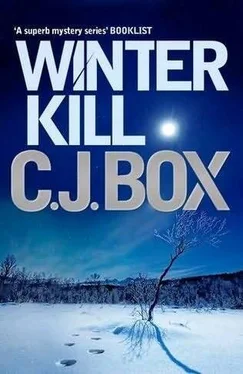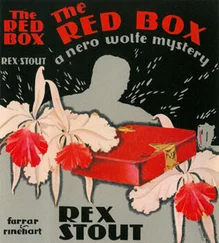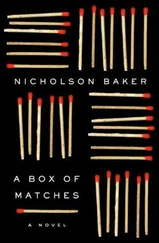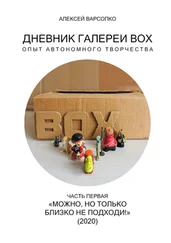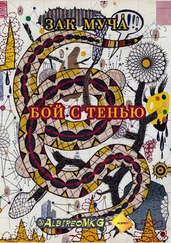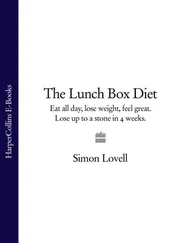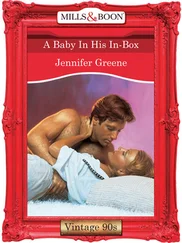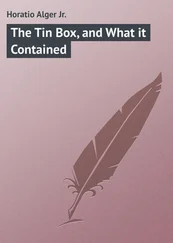“If you let me in, I wouldn’t be standing in it,” Joe said.
Cobb looked down. He didn’t invite Joe inside, which annoyed Joe slightly.
“What can I help you with?”
“Spud Cargill. He was a member of your church. I saw him there Christmas Eve.”
Cobb nodded, and pulled his bathrobe together across his chest.
“B.J., would you please close that door?” Mrs. Eunice Cobb implored from somewhere inside the trailer. “You’re letting all the heat out!”
“The game warden is here,” Cobb called over his shoulder. “He’s got questions about Spud.”
That silenced Mrs. Cobb, and she did not reply. Cobb turned back.
“Yes, Spud was a member of the congregation. He faithfully attended church about two times a year, three in good years. He wasn’t exactly a deacon in our church. You know, Mr. Pickett, I already answered these questions for the sheriff.”
Joe nodded. “Did the sheriff ask you if you knew where Spud might hide out?”
“Of course he did.”
“And your answer was…”
“My answer was that it was none of his damned business.”
Joe grunted and looked away. What a storm, he thought.
“You know that Spud murdered a man.”
Cobb chuckled. “You mean Elmer Fedd?”
“Lamar Gardiner,” Joe corrected, his voice flat.
“So I’ve heard,” Cobb said, while finding the ties to his robe and making a loose knot. “Now, Mr. Pickett, I don’t mean to be obtuse. I admire your tenacity, and I’ve heard you are an honest man. That’s rare. But I have strong feelings about state interference in people’s lives. It’s not my obligation to help out the state. It’s the state’s obligation to provide services for me, the taxpayer and citizen. I object to the kind of power the federal agencies wield here.”
“Still doesn’t mean Lamar Gardiner should have been murdered,” Joe said.
Cobb considered that. “You’re probably right.”
“And you know what?” Joe asked, shaking the snow off his coat. He raised his head and fixed his eyes on Cobb’s. “I’m not really here to debate this question with you, Mr. Cobb. I don’t really care all that much about Spud Cargill, either, if you want to know the truth. I’m here because I’ve got a little girl up there in that compound who might get hurt if the FBI and the Forest Service people have their way and raid it because they think he’s there. So if I can find out where Spud is-or isn’t-I might be able to help my little girl.”
Cobb’s expression changed. There was now a hint of confusion, as if he were weighing a dilemma. He searched Joe’s face, then returned to his eyes.
“I didn’t know that,” Cobb said softly.
“Don’t get me wrong,” Joe said. “We don’t think the same way, you and me. But in this case, I want to stop the Feds as much as you do. Just for a different reason.”
Cobb seemed to be considering something.
“Honey…” Mrs. Cobb said softly from inside. “I’m sorry, but I’m freezing .”
Cobb started to speak, then stopped. Then he set his mouth hard and rubbed his buzz-cut hair with the palm of his hand.
“Is he up there, Mr. Cobb?” Joe asked.
Cobb stepped back and felt for the handle of the door. Is he going to shut it in my face? Joe wondered.
“You are a man of God,” Joe said. “Convince Spud to turn himself in.”
“I am and he won’t.”
Joe tried to hide his elation. This meant that Cobb was-or had been-in contact with Spud Cargill. It also meant that Cobb could be arrested for assisting a fugitive. Both men knew that.
“It’s called sanctuary, Mr. Pickett,” Cobb said. “Spud believes in it. So do I. And I can’t help you any further.”
“So he’s here,” Joe said softly.
Cobb shook his head. “He was here. But he’s not anymore.”
Before Cobb closed the door and Joe heard a lock snap shut, Cobb raised his eyes and looked over Joe’s shoulder in the direction of the mountains.
The road to Nate Romanowski’s cabin was almost impenetrable, even though Joe had put chains on his tires before trying it. Four times, he got stuck. What should have taken an hour had taken three. It was midafternoon, although he couldn’t tell that by the sun or the sky. It was just as dark, and the snow was coming down just as hard, as it had been all day.
Joe had tried to call ahead but got a message that Nate’s phone was out of service. He remembered belatedly that the telephone had been damaged during the search of the cabin, that pieces of it had been scattered across the kitchen counter. He cursed while he dug under the front axle with a shovel to clear the packed snow that had once again stopped him. He hated to waste the time it took to dig himself out. Every hour that went by was an hour closer to the assembling of Munker and Strickland’s assault team in town.
Joe’s plan, formed as he left Cobb’s trailer, was to ask Nate if he would go up to the compound with him. Joe had learned through experience that backup in volatile situations was essential. Not having backup at Savage Run had nearly killed him, and it had resulted in the deaths of others. He had vowed never to approach a predicament like that again without help. And Nate and his big gun might provide help.
Finally, Joe was able to rock the pickup and break through the snowbank and over the rise to the river.
Nate’s cabin was dark and socked in, and his Jeep was gone. The complete absence of tracks suggested that Nate had been gone for at least a day.
Joe cursed again and thumped the truck seat with his hand. Pulling the evidence notebook from his pocket, he wrote out a note to Nate and attached it to the front door with a rusty penknife he found in his glove box. He also pinned a business card with his cell and home telephone numbers on it.
Nate:
You offered help. I need it now.
Joe Pickett
“Thanks for everything, Nate,” he growled, turning the pickup around. He drove back out in his own tracks.
For Sheridan Pickett, there was usually nothing more invigorating, or liberating, than having school let out because of snow. The announcement over the intercom had been received with unabashed cheers and whistles, and was followed by a mad scramble of books and uneaten lunches being thrown into backpacks.
Sheridan couldn’t share in the enthusiasm, though. A snow day meant nothing with her sister April gone.
Outside, the small fleet of buses had been lined up on the street, their engines idling, great clouds of exhaust rising up to meet the heavy snow.
Now she was home, safe and warm, curled up on the couch in her sweats reading an introductory book about falconry that had appeared in their mailbox the day before in an envelope addressed to her. Paper-clipped to the book jacket was a note written on the back of a beer coaster with foreign printing on it.
Sheridan:
People don’t choose the art of falconry like they choose a sport or a hobby. Falconry chooses them. After meeting you, I think you might be chosen. Please read this book carefully, and if you’re still interested I can teach you.
Nate Romanowski
She raised the coaster to her nose for the fourth time that afternoon and sniffed it. It still smelled faintly of beer. She tried to imagine where he’d gotten it. The printing on the coaster was in English and Arabic.
She opened the battered old book and looked at the photo plates of falcons, hawks, and eagles. The birds captivated her.
When the telephone rang, Missy appeared from the hallway and took it off the hook as Sheridan was reaching for it. Sheridan watched her grandmother with annoyance.
Читать дальше
